As you guys know, I’m a fan of theology, especially when theology is mixed into video games. And boy, is the Mass Effect series rife with theological constructs we can discuss.
Today we’re going to look at the simplest one that Mass Effect explores: does an all-powerful god exist?
In the Mass Effect series, there are only two specific instances when faith is explicitly commented on, and both of them take place in the original Mass Effect. The first one occurs during a conversation with Ashley Williams, who mentions her faith when talking about her deceased father, particularly her belief that Heaven – as Christians like Ashley describe it – exists. To her, there is no question that there is a god, and that god is the Judeo-Christian God.
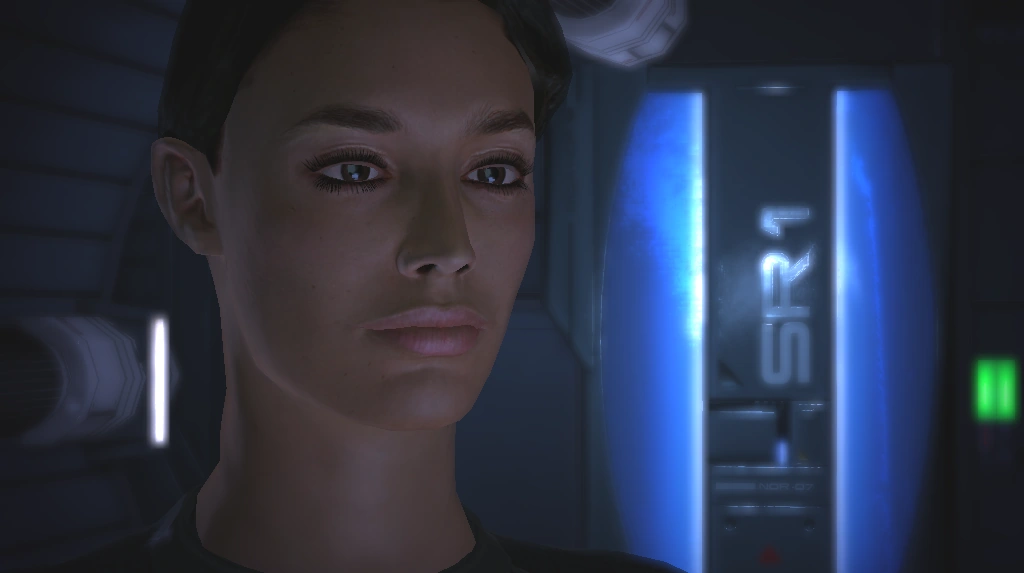
The other instance is after the fight with Matriarch Benezia. As she dies, she comments with distressed bewilderment that “they said there’d be a light,” referring to the oft-described phenomenon of seeing and going toward a bright light when dying. The implication is that Benezia does not see this light as she dies.

These two instances represent the two clear sides to the god issue: theism and atheism.
A Few Definitions
Theism is the belief in a god, whether it is the Judeo-Christian’s God, Islam’s Allah, Hindu’s Vishnu, or any other specific all-powerful deity or deities.
Note: For the sake of this article, I will be lumping the gods of all religions under the term “God.”
Theists generally take comfort in the knowledge that God is watching over them and watching out for them, and that there is something meaningful waiting for them in the next life (if they earn it based on the rules and regulations of their preferred religious doctrine). They believe that God is generally not vengeful, insofar as God does not purposefully harm life in the universe – at least without cause.

Atheism, on the other hand, is a disbelief in a god or other specific, named higher power. They take comfort in knowing that this physical existence is all there is, so it is up to each of us to make it worthwhile and meaningful. There is no higher power to answer to, and no final calculation after the final “game over.”

When looked at objectively, these are both beliefs, in their own way, as there is no scientific proof that supports or denies the existence of a god or higher power in the universe. While theists can be adamant their beliefs are correct, and atheists can be similarly adamant in their own beliefs, when we look at those ideas next to each other, both are simply different ways of interpreting the world around us.
Why the Details Are Important
This tug between theism and atheism revolves around the question of whether or not the universe houses an all-powerful being, with the understanding – by theists – that if such a being exists, that being is generally beneficent.
To provide a little contrast to another BioWare game, in the Dragon Age series the Maker is believed to exist, he is believed to be benevolent, but he is also believed to be absent from, and somewhat indifferent toward, his creations.

The Mass Effect series, on the other hand, plays the other side of the argument: what happens when the universe is most definitely full of a supreme power, also indifferent, but not so benevolent?
I’ve Got the Power
In this instance, the Reapers are the godlike power in the universe. They are all-powerful, influence the life of organics in the galaxy, and are distant and unknowable to the organics and synthetics who try to understand them. We talked last week about how the synthesize ending hinted at some of the themes in A Childhood’s End by Arthur C. Clarke. Let’s break that down a little more. Unmarked spoilers for Leviathan DLC ahead, just so you know!
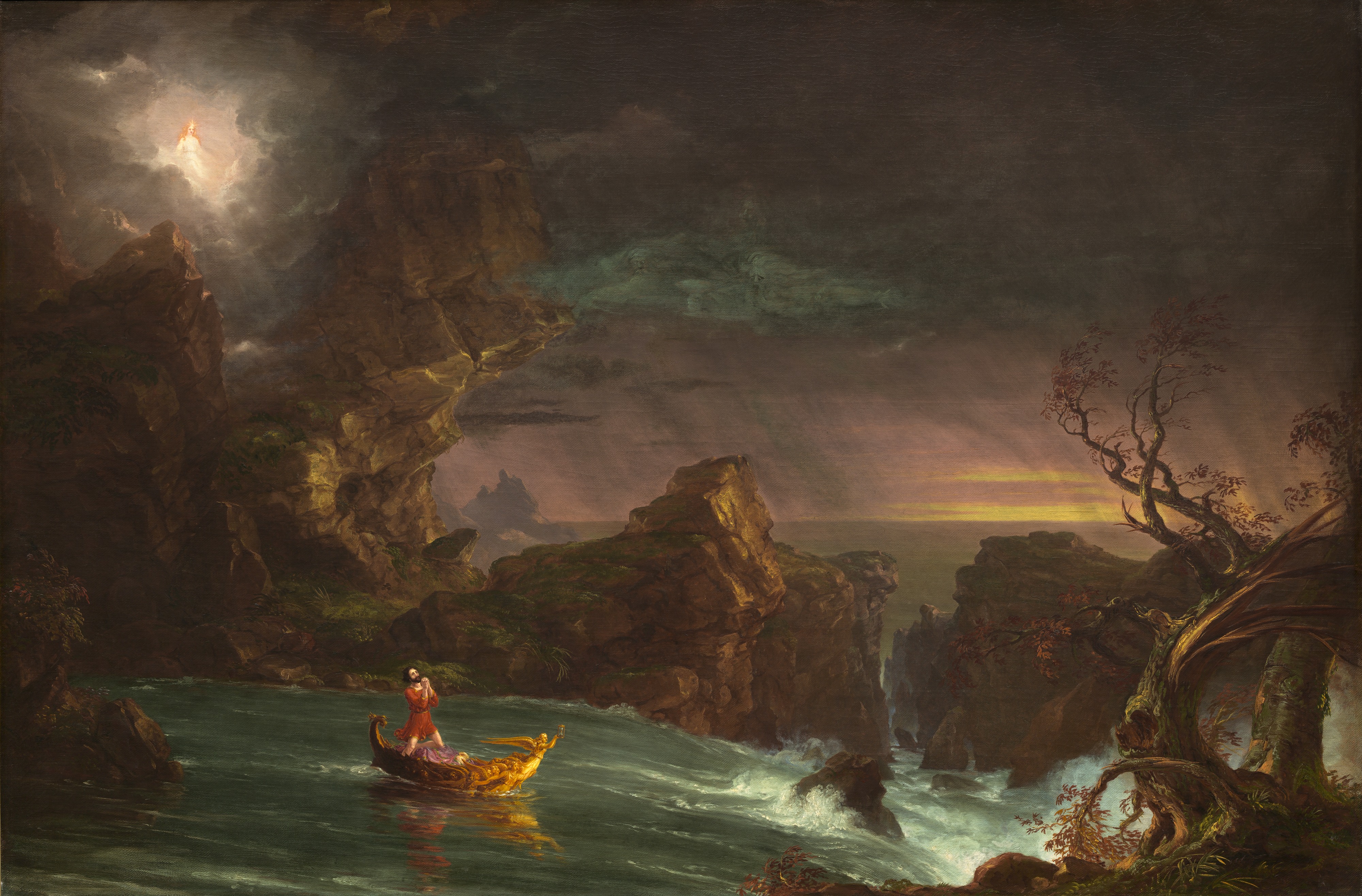
In Childhood’s End, alien creatures invade Earth. They are benevolent, and shape humanity to their liking – in this case, to become kinder and more altruistic in nature, and to improve their morals and ethics. Then, after many years have passed, they begin the final stages to prepare Earth for its destruction and to preserve the “best” of humanity in a way I won’t describe due to spoilers. In a fun twist, these aliens are only servants of other creatures – creatures that the aliens only serve and have no hope of understanding. They are only sent to do their job for whichever civilization is “next.”
.png)
Clarke is exploring the idea of elevating a species in order to become more godlike, in order to transcend our physical existence and – simply – become part of the greater, higher power in the universe.
Does this sound like another creature you know?
Fear the Reaper
The important difference between Clarke’s creatures and the Reapers, however, is their action. The creatures in Clarke’s novel are kind to humans, gently encouraging them toward better behaviors. The Reapers, on the other hand, seek to assimilate organics through displays of force and power, and annihilating any organics that stand in their way.
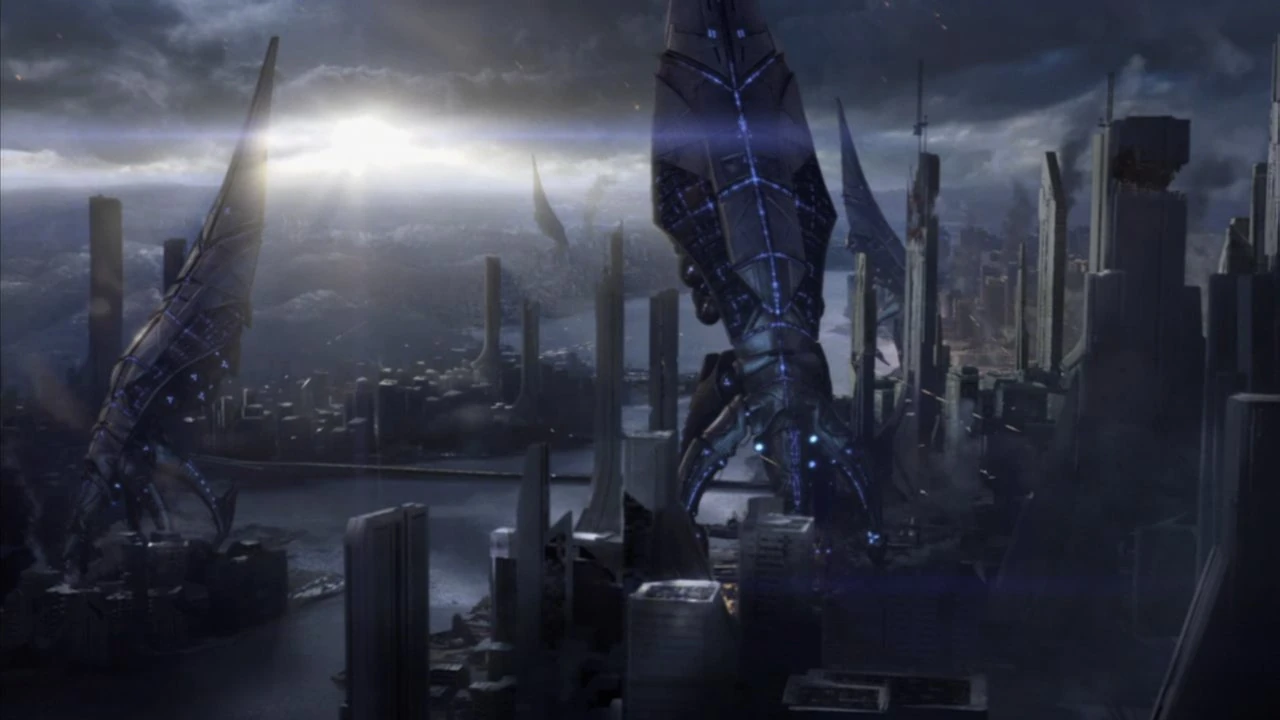
Reapers were meant, according to the Catalyst, to protect humanity from conflict with synthetics, and to preserve organics by assimilating them into the borg into the Reaper AI consciousness. They (try to) force evolutionary advancement onto organics, and they are not apparently successful, as the organics always seem to fight back (and lose).
This is because, like most vengeful gods (aka, those based most on human characteristics), the Reapers’ logic is based on flawed human principles, or in this case, flawed organic principles.

An example of these flawed human characteristics in a “real world” religion would be the story of Hera, Athena (not me), and Aphrodite all vying for the title of “most beautiful goddess” (human flaw of vanity). Another example would be Zeus’s infidelity. Or Hera’s jealousy. While these five examples are Greek gods, they have very human flaws, and often act as humans would, even though they are “supposed” to be gods (i.e., above petty human experience).

But back to the Mass Effect universe.
Leviathan believed his species to be gods, as they could bend the galaxy to their will. They created the Intelligence to solve the problem of organics creating synthetics, only for synthetics to rise against them, but with one little problem.
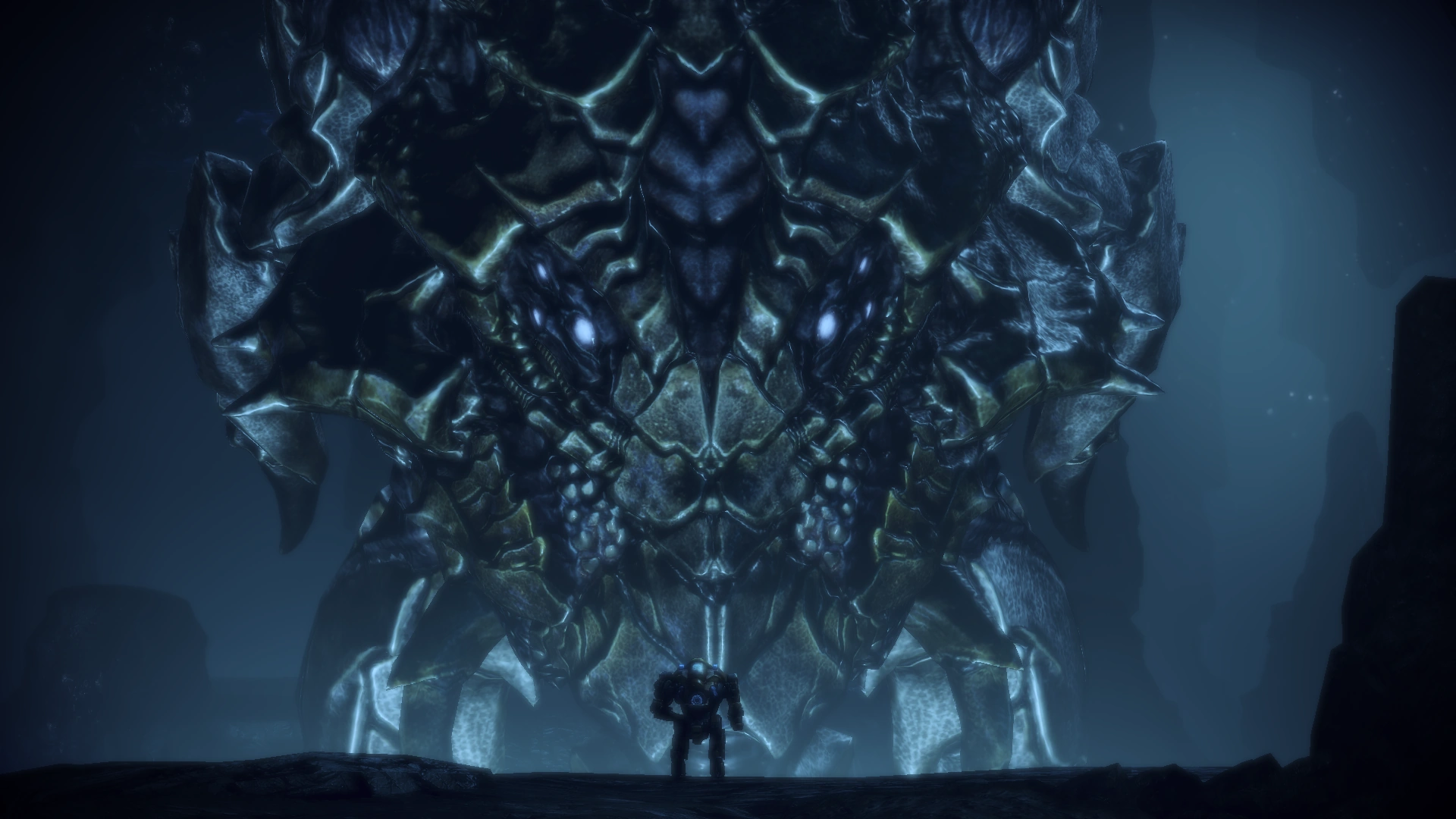
Historically, organics designed synthetics to serve them. As synthetics became more self-aware, they rebelled against their organic masters. So it was with the Reapers – synthetics created by organics. They are not all-knowing. They are based on flawed logic of the Leviathan race: aloof, uncaring, and convinced they know best.
And they’re coming to get you, because only they know best. Organics made plans, and the Reapers laughed.
The God Cycle
Regardless of whether the Reapers are good, evil, or simply a force in the galaxy, they also represent a cycle of creation and overthrow that permeates most religions. The Titans overthrew their creators, and were subsequently overthrown by the gods of Olympus. Even the vengeful God of the Old Testament was “overthrown” by the peaceful, accepting teachings of Jesus of Nazareth (in some religions).
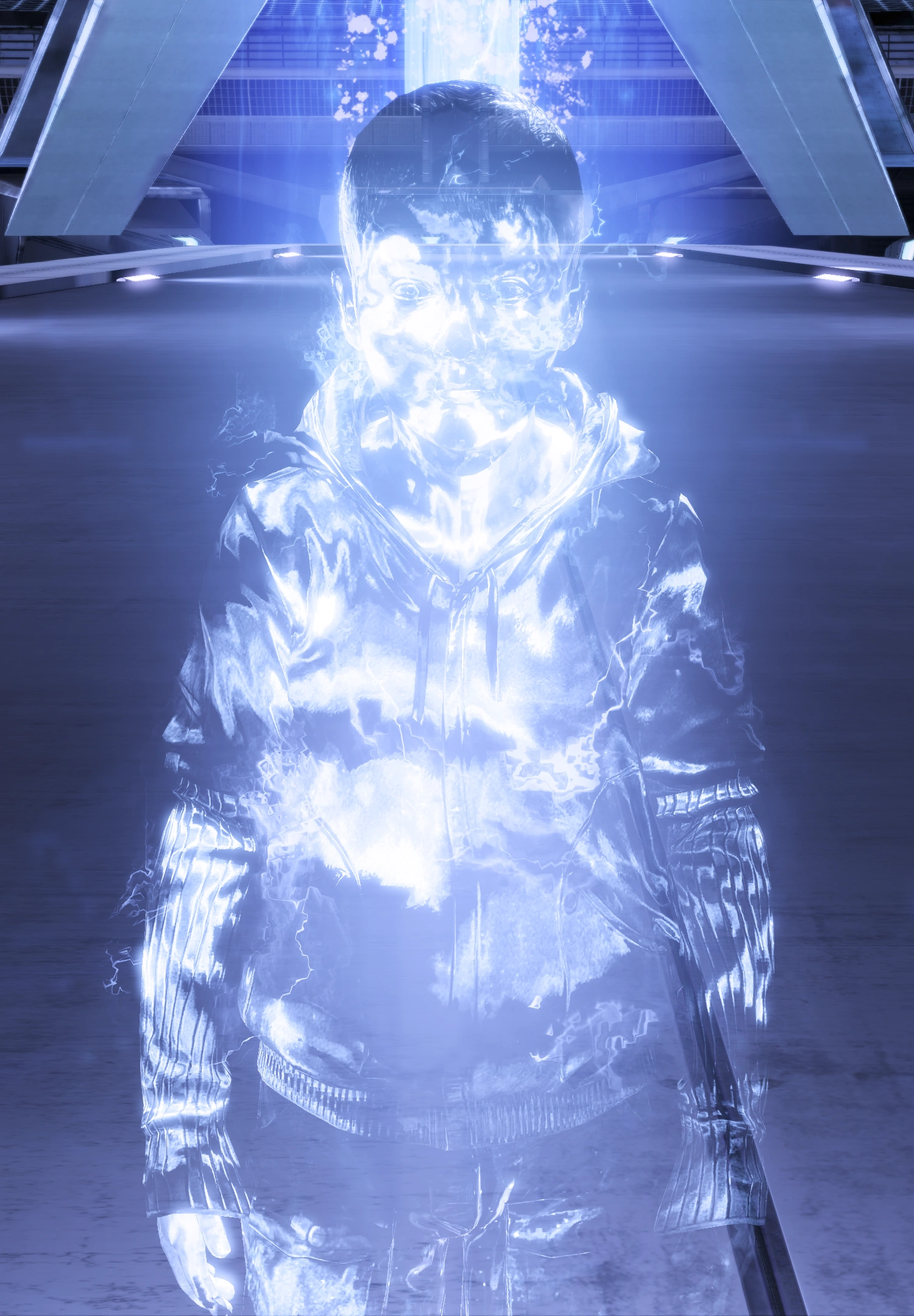
Likewise, in the Mass Effect series, this cycle continues. To survive, one must either destroy the gods, or become one. The Reapers overthrew their creators, and now… Shepard stands with the Catalyst, able to overthrow or destroy the Reapers if she chooses. But more on that next week…
Lingering Question
As we’ve seen, the Reapers have a purpose, but it is not one that is all-knowing. After all, if the Reapers logic were “perfect” like that of a “perfect” god, they would be able to fathom a world where organics and synthetics lived peacefully. Like Clarke’s creatures, they could encourage the creatures of the galaxy toward one type of behavior or another. But that isn’t how the Reapers work. So we are left thinking:
Is it more comforting for us to wonder if there is a god and about the nature of that god (a la Dragon Age), or to know there is a god, yet also know that god can – and will – destroy us when the whim strikes?
What do you think? Are the Reapers godlike, but only machines, or godlike machines? Are they simply misunderstood in their purpose, or do they grossly misunderstand organics? Let me know in the comments!
And join us next week when we take a look at the Catalyst’s relationship to the Reapers and Shepard.
Thanks for stopping by, and I’ll see you soon!
~ Athena
PS Childhood’s End is a fabulous book. It’s not often that I read an entire novel in one day, but I could not put it down, and so I highly recommend it. If you liked 2001: A Space Odyssey, you’ll like Childhood’s End.

Is your subscription to our blog not enough? Do you want more AmbiGaming? Of course you do! So you should definitely check us out on Twitter @TheAmbiGamer or subscribe to follow our Let’s Play adventures on YouTube!


The Reapers and the Catalyst are definitely misunderstanding the purpose of organic life and their capabilities. The best proof that the Reapers are wrong to assume that organics and synthetics will always be at war is that Shepard can convince the Geth and Quarians to work together to fight off the Reapers.
Additionally, the Reapers don’t understand that there is more to life than a consciousness or genetic legacy existing. Sure, TECHNICALLY the human race’s DNA would live on in the shell of a Reaper, and the Reaper would have the collective consciousness would be human in origin, but that would be it. They neglect the idea of the individual because they are not individuals, just like the Geth.
Like I said before (a long, long time ago), revealing the Reapers’ purpose ruined the lore about them. Had their purpose remained unknown, it would’ve cemented their role as machine-gods.
*sigh*
LikeLiked by 1 person
That’s a great point, but I wonder if BioWare’s intention was to make sure they *weren’t* seen as true, “eternal” gods? They are, after all, created. In an age where most religions see deities as fantastical (in comparison to Norse, Greek, and Roman gods, for instance, who were like superhumans), BioWare took this seemingly all-powerful being and made it flawed, breakable, and wrong. They aren’t omnipotent. They aren’t omniscient. They are, at their core, created creatures, just like everything else in the galaxy. Created creatures that got a little too big for their britches.
It’s sort of what Rowling does with Voldemort: a seemingly superhuman, unstoppable force dies with mundane thud, because at the end of the day he’s not superhuman, he is simply human.
I agree that they misunderstand organics, and that flawed logic is a driving force behind them taking such drastic (and terrible) actions against them. But maybe we would have seen them differently if they were trying to save the galaxy from the side-effects of element zero usage, like was originally intended?
LikeLiked by 1 person
I’d have to third that. The whole brokering of peace between the Geth and the Quarians does demonstrate that the Reapers have a huge misunderstanding of both organics and synthetics. You can argue that there’s no knowing that the peace would last in the absence of a more overwhelming enemy, but the fact that it’s there in the first place says a whole lot. It is the seed of hope. And if that could flourish, the way it flourished between the humans and the Turians after their war, then it would show that the divide between organics and synthetics is not nearly so vast as to necessitate the reset button being pressed to close out every cycle.
LikeLiked by 1 person
I didn’t bring it up here since I try very hard not to hit people with *too* many 2x4s during my posts, but while I was writing this, I was also thinking that maybe the Reapers aren’t as advanced as they think they are. After all, a machine that cannot go outside of its programming is not an advanced AI, is it? All the Reapers know how to do is what they were programmed to do.
And as the saying goes, he who knows not and knows not that he knows not, he is a fool.
… a big, creepy, space-bug shaped fool.
LikeLiked by 1 person
Oh! So you’re not the goddess of wisdom Athena… Thanks for straightening that out 🙂 I really need to play Mass Effect sooner rather than someday…
LikeLiked by 1 person
I’m not the *original* goddess of wisdom. I’m totally a goddess of wisdom though.
**crickets**
**more crickets**
Hahaha I’m proud of myself for keeping a straight face for that long!!
And yes, definitely do, Miss LightningAloy! 😉
LikeLiked by 1 person
“To survive, one must either destroy the gods, or become one.” There’s something about this line that’s particularly chilling. I think because I’m trying to relate it to FFVII. It needs to marinate, but I may have another essay based on this. I love looking at theology in relation to video games, because I’ve found them to be the media that makes me ask the most question.
I’ve been thinking about this for a while. Do godlike powers make one a god or is there something else inherent to godliness (and not just cleanliness) that we mere mortals can never hope to touch. There’s a quote about how any technology could seem like magic to a civilization that’s less advanced. So what we think of as God could just be a more advanced being, a programmer of sorts (which has tremendous meta implication for Mass Effect and any other game). The question of where the Reapers come from was bothering me from the moment I knew what they were, the fusion of organic and synthetic. Someone had to have had a hand in building them, and stories that deal in theology always seem to have a paradigm of the rebellion and the fall.
Fantastic article. I have more to say, but you’ve given me so much to think about, I may need to lay down.
LikeLiked by 1 person
I’d love to hear your expanded thoughts after your ideas have a chance to marinate. This is actually a topic I’m planning on revisiting, except with the Dalish gods of Dragon Age (I know, I know, but it supports the point you make about destroying the gods or becoming one, I promise!).
To me it’s particularly chilling that it’s a creature that fashioned itself as a god of its universe because of its power, except that it was flawed, like every other creature. I didn’t want to entirely turn this post into a theological one (it’s a pet interest of mine…I have a minor in religious studies), but the concept of a “creator” merely thinking itself to be a god because of it’s power, when it was in fact created (by another created creature?), is a fascinating thought experiment… and I totally didn’t mean to add to your headache! 🙂
But… yes, please stop by again if you’d like to chat more!! 🙂
LikeLiked by 1 person
Oh no headache! I need to lay down in order to think about this lol. I do some of my best thinking while laying down and right after sleeping. It gives the thoughts the ability to settle and drop seeds.
I didn’t study theology officially, but I’ve been doing my own study of mythology and religion for as long as I can remember. I think my angel obsession started around the age of five, and it just grew worse :p
LikeLiked by 1 person
Yeah I’ve always been interested in mythology and religion, as well. I feel bad that I subject all you guys to my religion ramblings every so often (this is the third post I done like this one haha), but it’s so fascinating!
And I’m glad I didn’t give you a headache haha
LikeLiked by 1 person
Are you serious?? I love this kind of thing! When I have the time to write essays, they have a heavy theological/mythology influence. You should definitely continue to write what you’re passionate about; it shows. I do understand worrying about talking peoples’ ears off with a certain subject, but readers can always not read the post. Some of my favorite bloggers will post things I’m entirely interested in, but I consider it like a beloved radio station. You might not like all the songs, but you love what they stand for 🙂
LikeLiked by 1 person
Aw, thanks. Shucks, I’m all embarrassed now… 🙂
LikeLiked by 1 person
I’m so happy someone else writes articles and essays about games and theology along with other themes. It’s very validating, and the world also needs more of this kind of discourse. Critical thinking is such a necessary skill, but the more I look, the more it seems many people lack it. You’re fostering it with these kinds of posts so I say the more the better!
LikeLiked by 1 person
I love how knowledgeable you are on the subject of theology! While I don’t understand anything about Mass Effect, your weaving of religion into video games is fascinating, which made it a great read nonetheless. Made me more interested in learning about Mass Effect too. Well done!
LikeLiked by 1 person
Thank you kindly! I’m glad you found it interesting 🙂 I tend to ramble about BioWare, and ramble about religion, so I’m glad I didn’t ramble anyone off into boredom haha. And Mass Effect has some very interesting lore, if you’re ever so inclined on checking out more, and the community is alive and well online, too!
LikeLiked by 1 person